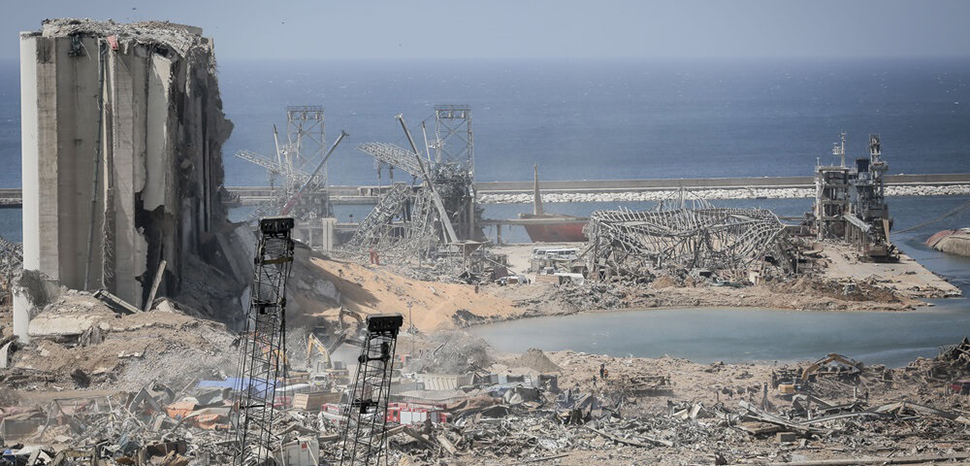The investigation into the explosion at Beirut port is back in the news as Lebanese investigative judge Tarek Bitar, who until recently led the investigation, attempted to resume his inquiry into the blast and issued new charges against senior and mid-level Lebanese officials after over a year’s suspension of the probe into the explosion.
The Lebanese investigation has repeatedly been stalling since its initial launch in August 2020 due to high-level political meddling and Lebanon’s lack of judicial independence. Most notably, legal complaints have been successively filed by Lebanese politicians against judge Bitar disputing his judicial powers and accusing him of bias, while his predecessor, Fadi Sawan, the first judge that was appointed to lead the investigation into the blast, was removed from the case in February 2021 after he had charged senior politicians in connection with the matter.
The massive explosion at the port on August 4, 2020, reportedly described as one of the most powerful non-nuclear explosions in history, resulted from the detonation of a large amount of ammonium nitrate stored in one of the port’s warehouses since October 2014 without adequate safety measures. The explosion killed more than 200 people, wounded over 7,000, and destroyed large sections of Beirut, leaving over 300,000 residents displaced.
As with any major investigation, a different spin was put on the crime at every twist and turn of the case, shifting responsibilities from one authority or party to another. A myriad of theories, opinions, statements, analyses, and speculations emerged, sometimes with presumed facts only supported by a few sources. The complexity of the case, involving numerous actors and potential criminal liabilities, has made it difficult to hold those responsible accountable, especially with the government pushback against the investigation’s proceedings.
Since the early days of the event, there were calls by various national and international actors, including senior Lebanese politicians, to launch a United Nations’ independent investigation into the explosion, primarily highlighting a Lebanese judiciary that is prone to political influence as well as Lebanon’s lack of technical capabilities to investigate a case of such complex scale. However, until today, while these calls have since then intensified as the Lebanese investigation has faced numerous obstacles, no resolution has been put forward by the member states of the United Nations Human Rights Council in connection with the matter and responsibility for the explosion has yet to be established. Additionally, while there have been foreign investigations into the blast at an early stage, including inquiries conducted by the United States Federal Bureau of Investigation (FBI) and French police, no investigation has led to conclusive findings.
Meanwhile, initial but compelling investigations were conducted by media outlets and advocacy organizations, such as the Lebanese television station Al Jadeed’s investigative unit, the reputable Sarajevo-based investigative media organization Organized Crime and Corruption Report Project (OCCRP), and the Human Rights Watch (HRW), uncovering critical evidence primarily based on an analysis of documents and official correspondence and presenting an almost full picture of the events that led to the August 4 port explosion.
For instance, Al Jadeed’s investigative unit reported that Lebanese Officials were warned about the gravity of the threat posed by the explosive materials offloaded at the port’s warehouses but took no action to remove them, while OCCRP’s investigation revealed information about the ammonium nitrate cargo ship’s ownership as well as the cargo’s customer and other actors involved in the shipment operation, raising questions about the circumstances surrounding the arrival of the ship at the port. Most notably, HRW, who to date conducted the most comprehensive investigation into the explosion, concluded that there was evidence to suggest that multiple Lebanese authorities were criminally negligent under Lebanese law over their handling of the ammonium nitrate cargo.
Along with investigations conducted by media and advocacy groups and amid calls for a UN investigation, civil lawsuits were also filed overseas to circumvent the stalled Lebanese investigation and in the hope of bringing justice to the victims. To date, two major international lawsuits have been filed, one in August 2021 in the United Kingdom by the Beirut Bar Association (BBA) against UK-registered chemical trading company Savaro Ltd. – allegedly the owner of the ammonium nitrate cargo – and another by victims of the port explosion against the US-Norwegian geophysical services group TGS in Texas in July 2022. TGS owns the UK-based seismic surveying company Spectrum ASA that chartered the ship that delivered the 2,750 tons of ammonium nitrate to Beirut. Both ongoing lawsuits are significant, as they attempt to uncover new evidence during the legal proceedings that may support the Lebanese investigation and ensure victims get recourse to justice outside Lebanon.
To conclude, the Lebanese investigation is currently facing various legal challenges surrounding jurisdiction, accountability, and access to evidence. In its most recent development, the investigation seems to be premised on which legal theory will prevail, or at least so, as Lebanon is witnessing a legal face-off between judge Bitar and Lebanon’s top public prosecutor Ghassan Oweidat, with both questioning each other’s authority over the matter and filing charges against the other. Oweidat issued a travel ban a few weeks ago against Bitar and ordered the release of all suspects detained in connection with the port explosion right after Bitar issued his latest charges, while Bitar denied Oweidat’s legal powers, underscoring the fact that Oweidat himself was charged in connection with the explosion.
The views expressed in this article belong to the authors alone and do not necessarily reflect those of Geopoliticalmonitor.com.




